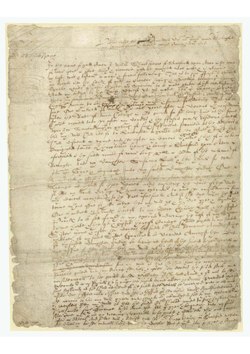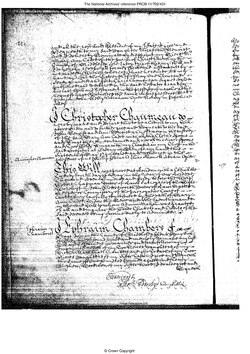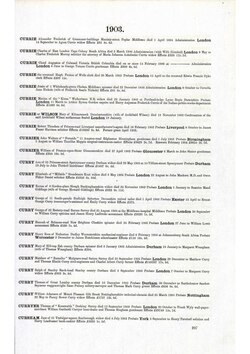
Before some of our ancestor's died they had a will and testament drawn up to establish who would inherit their property and land. A will referred to bequeathed realty (buildings and land) and a testament established how the personal property of the deceased was to be divided. You will find a will and testament together in the same document and today they are often referred to simply as a will. Probate is the process in which the will is proved and gives a person the legal right to deal with the testator's estate when they have died.
Not everybody leaves a will. You will likely discover that some of your ancestors have a will whereas others have not. Where they do survive they may give you the names of their spouse and children as well as cousins, grandchildren and other relations. Friends and colleagues may also be named. The level of detail a will goes into varies greatly. Some simply state that they leave everything to a spouse whereas others list their belongings in great detail, naming multiple family members.
There are two differing ways to discover if your ancestor left a will depending on the date it was proven. The Principal Probate Registry was established on at the beginning of 1858. There are therefore different ways prior to this date and afterwards.
Research your ancestors on MyHeritage
Genealogical information in WillsGenealogical information in Wills
Some short wills give little information. The most basic will give you the testator's name, who they are leaving their estate to and the date the will was proved. A majority of wills give more information than this. Potential details include:
- The full name and title of the testator
- The testator's occupation and religion
- The residence and marital status of the testator
- Where the testator wishes to be buried
- The extent of the property and land that the testator owned
- Details of any leased properties
- Their financial situation and wealth
- Any debts the testator owed
- Names of relatives and how they are related
- Details of their bequests
- Witnesses to the will
- Name(s) of the executor or executrix
Locating Wills pre-1858Locating Wills pre-1858

Up until 12th January 1858 all wills had to be proved by the church and other courts, including peculiar courts.[1] Where a person's will was proved depended on where they owned property. If the testator owned property in one diocese the will could be proved at their local Archdeacon's court. If the testator owned land or property that lay within two different dioceses, then it would be proved by the Prerogative Court of Canterbury (PCC) or The Prerogative Court of York (PCY). These latter courts covered different areas of the country. If a person owned property within both, then the will would be proved at PCC as this was the highest court.
A majority of wills are held at the local county archives. Wills proved at PCC or PCY are held at The National Archives. Some have been digitised and/or transcribed and are available to view online. Those available on MyHeritage can be viewed in their United Kingdom - Wills & Probates record sets.
Locating Wills post-1858Locating Wills post-1858

With the arrival of the Principal Probate Registry in 1858, it becomes much easier to search for an ancestor's will. This covers England and Wales. You can search on the National Probate Calendar's website for free using a person's name and any other details you know, including the year of probate. If there is a positive result you will be able to see a short summary for free. You can then choose to order a copy of the full will for a small fee. The index can alternatively by viewed in the England & Wales, Index of Wills and Probates, 1853-1943 collection on MyHeritage.
InventoriesInventories
Inventories were compulsory between 1530 -1782 but not all have survived. They list every item owned by the deceased including their farm livestock, items of furniture and items of crockery. Beside each item, the estimated value is given. Inventories give a real insight into our ancestor's life, listing all of their possessions and also gives us a clue as to how wealthy they were depending on their value. They can be found in the relevant archive where they survive but they are not always kept with the person's will.
Death dutyDeath duty
Death duty was a type of inheritance tax in use between 1796 - 1903. During this period, will summaries were sent to the Stamp Office. These give brief details from the will such as the deceased’s name, their date of death, their residence and the executor's name. Indexes and some images are available to view online. These are particularly useful where the original will has not survived or is illegible. You can search some of these entries in the United Kingdom, Index of Death Duty Registers, 1796-1811 collection on MyHeritage.
Issues of using Wills for genealogical researchIssues of using Wills for genealogical research
Wills are very useful documents to use for genealogical research. There are some potential issues to be aware of however:
- If a child of the testator is not named in the will, this could be because the child was deceased prior to the will being written, because they were intentionally left out due to feelings of ill will or because the child had already been provided with their inheritance prior to the testator writing the will. Try not to assume they have been left out due to a family falling out as there may be another reason.
- Not everybody left a will, known as intestate. In these cases you may find letters of administration (also known as admons) giving the name of the executor/executrix and the name of the deceased.
- Up until 1883, a woman’s property legally became her husband’s when they married. You will be able to find wills created by unmarried women and widows and there are a few very rare exceptions written by married women.
- Not all wills have survived and many inventories have also been lost.
- Be aware of the date that the will was written. This may be several years or even decades before the person died. In that time they may have changed spouse or occupation and people named in the will may have pre-deceased them.
- Relatives are not always named. A person may leave property to 'my wife' or 'my son' without a given name.
See alsoSee also
Explore more about wills and probate in England and WalesExplore more about wills and probate in England and Wales
- United Kingdom - Wills & Probate record sets at MyHeritage
- Three Uplifting Inheritance Stories on the MyHeritage blog
- Connecting Generations through Probate and Property webinar at Legacy Family Tree Webinars
- How to look for records of Wills 1384-1858 at The National Archives
- How to look for records of Wills and administrations after 1858 at The National Archives
References
- ↑ Church Courts - probate records before 11 January 1858. Norfolk Record Office

